

Sustainable Investment Report 2025
About Wespath
Wespath Benefits and Investments is a nonprofit agency of The United Methodist Church. In accordance with its fiduciary duties, Wespath Benefits and Investments administers benefit plans and, together with its subsidiaries, including Wespath Institutional Investments (WII), invests nearly $26 billion in assets on behalf of over 100,000 participants and over 150 nonprofit organizations (as of December 31, 2024).
Wespath Benefits and Investments administers one of the largest faith-based pension funds in the world.


Wespath Benefits and Investments implements the sustainable investment strategies for investment funds made available through its subsidiaries. This Sustainable Investment Report does not constitute an offer to sell securities. An offer for the sale of interests in the P Series funds and the I Series funds will only be made through the Investment Funds Description – P Series and Investment Funds Description – I Series, respectively.
Throughout this report, Wespath Benefits and Investments and its subsidiaries are referred to collectively as “Wespath.” This report primarily highlights Wespath’s sustainable investment activities throughout 2023 and 2024.
Get to Know Wespath
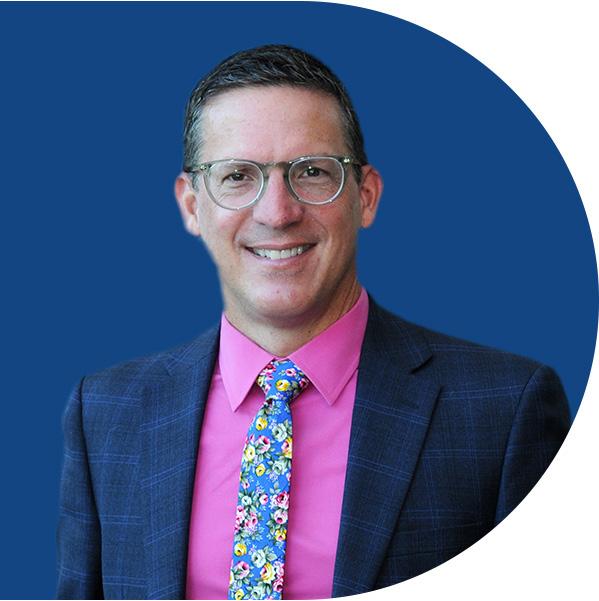
Meet Wespath’s General Secretary
Andy Hendren
General Secretary and CEO
Joined Wespath: 2004, became CEO in January 2022
Prior to becoming general secretary/CEO, Andy was Wespath’s general counsel/chief legal and governance officer. Andy is also on the board of directors of the Church Benefits Association, a multi-denominational interfaith coalition whose members manage over $100 billion in benefit plan assets. Andy is also a trustee for Garrett-Evangelical Theological Seminary.
Fun fact: Andy has recently joined the board for Treehouse Humane Society, the no-kill cat shelter where Andy and his wife, Lizzie, adopted their cats.
Welcome from Wespath’s General Secretary and CEO
From Wespath’s board of directors and our staff, thank you for your interest in our 2025 Sustainable Investment Report.
Each time we publish a Sustainable Investment Report, I’m reminded of the trust placed in Wespath—to steward assets of others with care, skill, prudence and diligence, while also honoring our Methodist values and principles. This year’s report reflects not only our continued commitment to that responsibility, but also the ways we are evolving to meet the moment.
To pick just one example, our work is no longer defined predominantly by traditional, formula-based pension plans. In just a few months, we will launch Compass, a new entirely account-based, defined contribution plan designed for United Methodist clergy. Thus, we are increasingly serving individuals who are required to make more personal choices about how their retirement savings are invested.
That shift brings new opportunities and new responsibilities. It calls us to offer more choice and new resources to help our customers align their investments with their values. Our recent expansion of our Social Values Choice fund offerings is one example of how we’re responding to that call.
But even as we adapt, we remain grounded in the same principles that have guided us since 1908 the sacred commitment to care for those who serve the Church. We believe that sustainable investing is not just compatible with strong financial performance— it can enhance value. We believe that shareholder engagement is a powerful tool for improved outcomes. And we believe that our voice, as a faith-based investor, matters.
This report highlights the many ways Wespath is living into that vision: our leadership in the Net-Zero Asset Owner Alliance, our work on human rights in conflict-affected areas, our growing portfolio of impact investments in affordable housing and community development, and much more. You’ll also see how we’re holding ourselves accountable through data, transparency and a commitment to continuous improvement.
We know that sustainable investing is not a destination, but a journey. And we know that we can’t do this work alone. That’s why we’re grateful for your partnership, your feedback and your shared commitment to doing all the good we can—in all the ways we can.
Wespath Overview
of December 31, 2024
Stewarding investment funds for:
Over 100,000 participants
Invested with women- and/ or minority-owned asset managers:
$1.5 billion
5.7% of total AUM
150+ institutional investors
Invested in affordable housing and community development:
2.3% of total AUM $586 million
Wespath Board of Directors
Wespath’s Investment Division*

Chief Investment Officer and Chief Executive Officer of Wespath Institutional Investments LLC
Johara Farhadieh
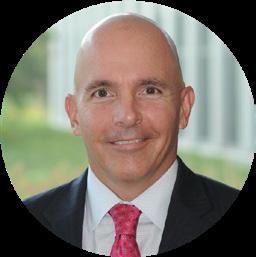
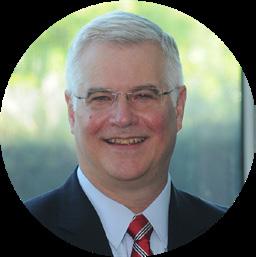
Team
Team
Team
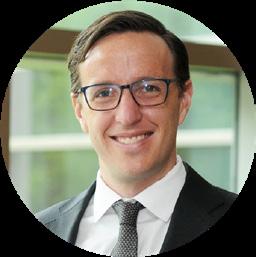
Wespath Sustainable Investment Tools
Sustainable investment strategies are investment strategies designed to strengthen Wespath’s potential to consistently provide strong, long-term financial returns via tools such as exclusions, engagements and impact investing. Here is a little bit more information about some of those tools:
Asset Manager Engagement
Engagement with Wespath’s current and prospective asset managers on sustainable investment-related issues relevant to Wespath’s portfolio holdings.
Corporate Engagement
Direct dialogues with the companies in which Wespath invests. Often, accomplished alongside other likeminded investors.
Policy Engagement
Contacting policymakers and regulators to support ideas and topics at the macroeconomic level that Wespath believes will lead to improved market-wide returns.
Exclusions
Avoiding investments in companies or entities with a core business activity that does not reflect the values of The United Methodist Church. These are also called ethical screens. Wespath also avoids investments to improve investment results by reducing financial risk.
Impact Investments
Investments that seek to strengthen local and global communities while earning market rates of return commensurate with risk. Wespath’s most well-known impact investment program is the Positive Social Purpose (PSP) Lending Program, which seeks to participate in loans in the United States for affordable housing and community development facilities, as well as international microfinance lending opportunities.
Thought Leadership
Insights, ideas and perspectives shared by individuals or organizations recognized as experts in their field, aimed at influencing thinking and decision-making within their field.
How Wespath uses investment exclusions across its portfolio
Wespath applies two types of investment exclusions to all its funds: ethical exclusions and sustainability-related financial risk exclusions.
Sustainability-Related Financial Risk Investment Exclusions
These exclusions seek to enhance long-term investment performance by reducing exposure to certain types of risk. More specifically, this refers to Wespath not investing in a particular issue or set of companies or industries that expose investors to high levels of sustainability-related financial risk.
Wespath has established sustainability-related financial risk investment exclusions for climate change and human rights. For instance, as per its climate change guideline, Wespath does not invest in thermal coal companies—a type of coal primarily used to generate electricity.
As of December 31, 2024, Wespath excludes:
94
companies under the climate change guideline.
43
companies and the debt of 12 countries under the human rights guideline.
Ethical Investment Exclusions
As the name implies, these investment exclusions reflect the values of The United Methodist Church. In practice, it means Wespath does not invest in companies or entities with a core business activity that involves the production and/or assembly, direct sale, distribution, and/or marketing of the following products and/or services:
Generally, a core business is one that accounts for 10% or more of a company’s revenue derived from the objectionable products and/or services and discontinuing the product or service would materially change the nature of the company’s operations.
The United Methodist Church’s (UMC) Social Principles and The Book of Discipline (the governing document detailing the UMC’s rules and procedures) are the foundation of Wespath’s ethical investment exclusions policy.
Explaining why Wespath prioritizes asset manager
engagement
Wespath does many things to manage sustainability issues and invest in alignment with the values of the UMC. One of the primary ways we manage sustainability risks is through engagement, which is also called investment stewardship or active ownership. Engagement refers to Wespath using its influence as an investor to enter constructive dialogues and offer suggestions to companies, asset managers and policymakers.
Wespath’s Sustainable Investment Strategies team prioritized asset manager engagement in 2023 and 2024, spending a significant amount of time in discussions with the asset managers Wespath hires to invest on its behalf.
Why does Wespath engage asset managers?
Wespath’s Jake Barnett, Managing Director of Sustainable Investment Strategies, succinctly explained many of the advantages of asset manager engagement in a story he co-authored in Responsible Investor in 2021.
“ Asset managers are powerful stewards of asset owners’ long-term interests.
Wespath’s Jake Barnett and Allianz’s Patrick Peura wrote
“Asset managers are powerful stewards of asset owners’ long-term interests,” Barnett and Allianz’s Patrick Peura wrote. “They choose the companies in our portfolios, conduct corporate engagements, cast votes on directors … and influence the economic system through lobbying and discourse.”
In 2022, Barnett and Peura helped write a paper titled The Future of Investor Engagement, which provided a detailed rationale for asset owners to engage their asset managers. One benefit of this engagement, the paper noted, is some asset managers have a great deal of influence.
“Asset managers often have long-standing and strong relationships with companies in their portfolios and hold more concentrated positions in companies than their asset owner clients,” according to The Future of Investor Engagement. “This gives clear weight and influence to any messaging that asset managers deliver to companies.”

2023-2024 Engagement Activity
engagements with companies, asset managers and policymakers on issues related to climate change, human rights and governance
Asset manager engagements (breakdown by asset class type):
Corporate engagements (breakdown by GICS sector):
Wespath recognized as a leader in system-level investing
Wespath was one of five institutions profiled by The Investment Integration Project (TIIP) in its report about leading system-level investors.
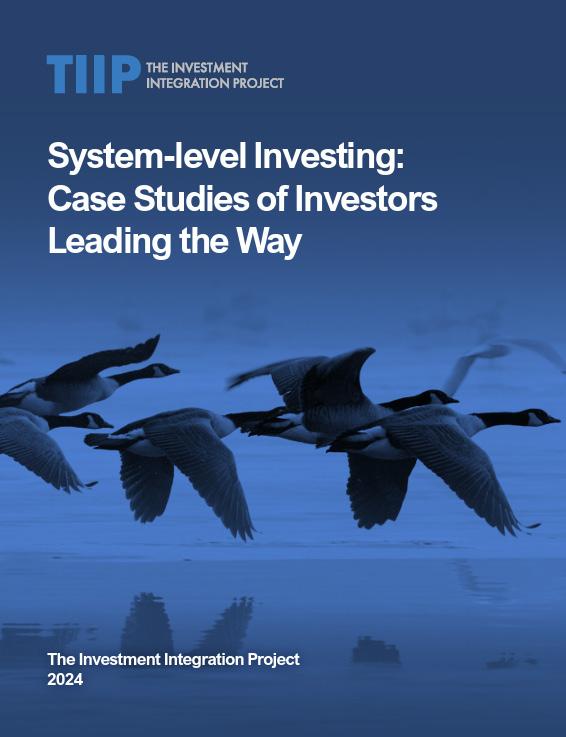
TIIP, a consulting and research firm, studied institutional investors and concluded many are concerned about big social and environmental issues that affect the entire economy and have a link to their investments. The data TIIP collected showed that those same institutional investors also needed more information and evidence to act on their concerns. The TIIP report, published in 2024, was designed to help bridge the gap.
Wespath and the other four investors highlighted in the case studies about the value of system-level investing “demonstrate where the (sustainable investing) field is headed and present a path forward for other investors to learn from their peers and join the evolution of investment,” said William Burckart, TIIP’s CEO.
What is system-level investing?
System-level investors believe that profitable, long-term investment depends on healthy financial, social and environmental systems. They consider the interconnection between environmental and societal systems under stress and how that can lead to adverse portfolio performance.
What is Wespath’s approach?
The TIIP report highlights how Wespath’s investment strategy seeks to actively strengthen the environmental, social and financial systems that support long-term value creation.
Wespath’s leadership in collaborative engagements was recognized. The TIIP report noted that as co-chair of the Investors for Opioid and Pharmaceutical Accountability, Wespath helped secure governance reforms at major pharmaceutical companies.
TIIP emphasized the importance of internal champions in advancing system-level investing. Wespath’s Jake Barnett was highlighted for his leadership in shaping industrywide stewardship practices. Barnett serves as co-lead of the engagement working group for the Net-Zero Asset Owner Alliance (Alliance). The Alliance’s work—including the publication of The Future of Investor Engagement paper that Barnett helped draft—also received recognition in the TIIP report.
2025 and Beyond
Preparing for PRI 20-year anniversary
Wespath is helping develop the agenda for the United Nations Principles for Responsible Investment (PRI) in Person conference in October 2026, which will celebrate the organization’s 20-year anniversary. Wespath was a co-author and founding signatory to the PRI in 2006. The PRI has become the world’s leading proponent of responsible investment.
Planning for the future of the sustainable investment industry
Wespath and the Church of England co-facilitated a meeting in London in the spring of 2025 that brought together established asset owner leaders to discuss the future of the sustainable investing industry. There was interest in exploring the best ways for asset owners like Wespath to lead in this moment.
Investment Process

Meet Our Wespath Expert
Johara Farhadieh Chief Investment Officer
Joined Wespath: October 2023, became CIO in August 2024
Johara is responsible for managing the entire Wespath investment operation, including overseeing the Investment Management, Institutional Investment Services and Sustainable Investment Strategies teams. She also serves as CEO of Wespath Institutional Investments LLC, a Wespath subsidiary that manages investment funds for nonprofit institutional investors.
Fun fact: Prior to Wespath, Johara served as the executive director and CIO of the Illinois State Board of Investment (ISBI), where she oversaw the investment management of state employees’ retirement benefits. During her tenure, ISBI had the best performing private equity portfolio among all public pension funds in the U.S. three years in a row.
A note from Johara: Focused on long-term returns
As I reflect on my first year as Wespath’s Chief Investment Officer, I am inspired by the dedication of our teams, the strength of our partnerships and the trust our investors place in us. It’s hard to believe how much we’ve accomplished together in just a short time.
I’m so proud of the work you’ll read about in this section of our Sustainable Investment Report. It details the thoughtful, collaborative work that goes into building and managing Wespath’s investment program.
At the heart of our approach is a commitment to investment excellence—delivered through rigorous fund construction, careful asset manager selection and diligent ongoing monitoring. These are not just technical processes; they are expressions of our responsibility to steward assets in a way that supports long-term performance, aligns with our values and advances our investors’ long-term goals.
This past year, we were proud to launch the Social Values Choice funds for institutional investors, marking an exciting milestone that reflects our commitment to offering investors more choice in how they express their values through their investments. We’re especially
proud that this launch included bringing on a womanand minority-owned asset management firm—an example of how we can advance both performance and inclusion.
None of this would be possible without collaboration. Internally, our Investment Management team works hand-in-hand with our Sustainable Investment Strategies team to ensure that sustainability considerations are embedded throughout the investment process. Externally, we continue to engage with peer organizations and industry partners to share insights and elevate standards across the investment landscape.
This is what sustainable investing looks like at Wespath: a thoughtful, fiduciary-focused, valuesdriven process that brings together expertise, innovation and a deep sense of purpose. I’m excited about where we’re headed, and I’m grateful to be on this journey with all of you.

How a collaborative approach drove asset manager due diligence—and benefited Wespath’s investors
A staggering $15 trillion shortfall in global infrastructure funding by 2040 presents a compelling opportunity for investment. Infrastructure—including energy grids, water systems, transportation networks and more—offers not only essential services but also the potential for steady, inflation-protected returns. For Wespath, this asset class aligns well with the objectives of our Inflation Protection Fund in both the I Series and the P Series, supporting our goal to deliver long-term financial returns while preserving purchasing power.
Wespath recently completed a rigorous, cross-functional process to identify infrastructure asset managers. Our Private Markets, Fixed Income, Impact Investing and Sustainable Investment Strategies teams worked together to evaluate candidates both on financial performance, and on their integration of sustainable investment practices. This collaborative due diligence ensured Wespath selected managers that can navigate both traditional risks and emerging sustainability considerations.
Ultimately, Wespath selected two complementary managers: one with a strong net-zero commitment, and another focused on secondary and co-investment opportunities. These asset manager selections reflect Wespath’s belief that long-term value is best achieved through diversified strategies and a holistic view of risk and opportunity. As Wespath continues to build its infrastructure portfolio, it remains committed to seeking investments that serve our participants and institutional investors with integrity, resilience and purpose.
Learn More
Scan the QR code: How a Collaborative Approach to Investing in Infrastructure Benefits Wespath’s Investors

Wespath CEO Andy Hendren (left) and Wespath CIO Johara Farhadieh (right) hosted Xponance founder and CEO Tina Byles Williams at Wespath’s office in December 2024 to discuss Wespath and Xponance’s partnership on the Social Values Choice Equity Fund.
What is Wespath’s Investment Process?
Wespath’s investment process is structured into several key phases: fund construction, asset manager selection, client asset allocation and ongoing monitoring.

Fund Construction starts by defining the fund’s objective and setting asset allocation. For single-asset-class funds, this includes sub-asset class exposure (e.g., U.S., international, small-cap, large-cap) and choosing between active, passive or blended strategies. Purposeful diversification and risk management ensure complementary strategies and alignment with each fund’s target risk profile.
Manager Selection involves identifying asset managers through networks, databases and events. Wespath emphasizes inclusivity, considering industry leaders; boutique, emerging asset managers; and womenand minority-owned firms. Final asset manager recommendations go to Wespath’s internal Investment Committee, chaired by CIO Johara Farhadieh.
Client Asset Allocation depends on the type of investor and their unique goals, risk tolerances, liquidity needs and investment goals. For participants, tools like LifeStage Investment Management and resources like EY Financial Planning Services help ensure a portfolio that meets their needs. For institutional investors, Wespath’s Client Asset Allocation Committee develops customized strategies, supports investment policy statement development and monitors ongoing compliance with the investment policy statement.
Ongoing Monitoring is continuous. Wespath tracks fund performance daily and over time, ensuring alignment with objectives and benchmarks. Asset managers are reviewed quarterly through meetings, questionnaires and site visits.
Within each phase of our investment process, Wespath has the opportunity to embed sustainable investment principles. During fund construction, values-based exclusions are incorporated into fund design. In asset manager selection, sustainability capabilities and alignment with Wespath’s core values are key evaluation criteria. Ongoing monitoring includes sustainability performance reviews, analysis of asset manager stewardship practices and more. In assisting clients with their custom asset allocations, Wespath can help integrate client values-based considerations into client investment policies—or even suggest specific funds that include heightened sustainability criteria.
How Wespath’s investment process drove our latest fund launch—and empowered investor choice
In December 2024, Wespath marked a significant milestone with the launch of the Social Values Choice Equity Fund – I Series (SVCEF-I) and the Social Values Choice Bond Fund – I Series (SVCBF-I). This expanded Wespath’s Social Values Choice offerings, which were already offered by Wespath to retirement plan participants and plan sponsors through the P Series funds.
These new funds were designed to meet the growing demand from institutional investors—such as faithbased nonprofits and mission-driven organizations— for investment options that align with their values, particularly around climate risk and human rights.
The launch was the culmination of a rigorous, multiphase investment process. It began with fund construction, where our investment team defined the objectives, benchmarks and asset allocations to seek to ensure the funds would meet client needs. The next phase—asset manager selection—was especially critical. Wespath cast a wide net, leveraging decades of industry relationships and conducting in-depth due diligence to identify asset managers with both technical excellence and values alignment.
A standout outcome of this process was the selection of Xponance as the asset manager for SVCEF. Xponance brings a client-centric approach and deep expertise implementing custom client portfolios. The firm’s ability to implement heightened exclusionary screens—while maintaining investment performance—was a key factor. A woman-led, 100% employee-owned firm, the collaboration with Xponance also reflects our broader commitment to diversity and innovation in asset management.
In addition, the selection of Xponance helped reduce the management fee for SVCEF-P by more than 50%.
“Our top priority is to provide our investors with investment excellence. We seek to deliver that through a diligent investment process which prioritizes working with world-class asset managers to provide our clients with investment solutions that meet their needs,” CIO Johara Farhadieh said at the time of the fund launch. “I am confident the new Social Values Choice funds will achieve that for our institutional clients looking for more customized values-aligned investment options.”
Our top priority is to provide our investors with investment excellence. We seek to deliver that through a diligent investment process which prioritizes working with world-class asset managers to provide our clients with investment solutions that meet their needs.
Wespath’s Johara Farhadieh said at the time of the fund launch
2025 and Beyond
Social Values Choice (SVC) Funds coming to LifeStage Investment Management
In 2024, Wespath announced that it will soon offer the P Series SVC funds in LifeStage Investment Management (LifeStage) for retirement-plan participants by early 2026. LifeStage creates a participant’s investment portfolio—and automatically adjusts it over time—based on personal factors like age and risk tolerance.
Climate Change and Biodiversity
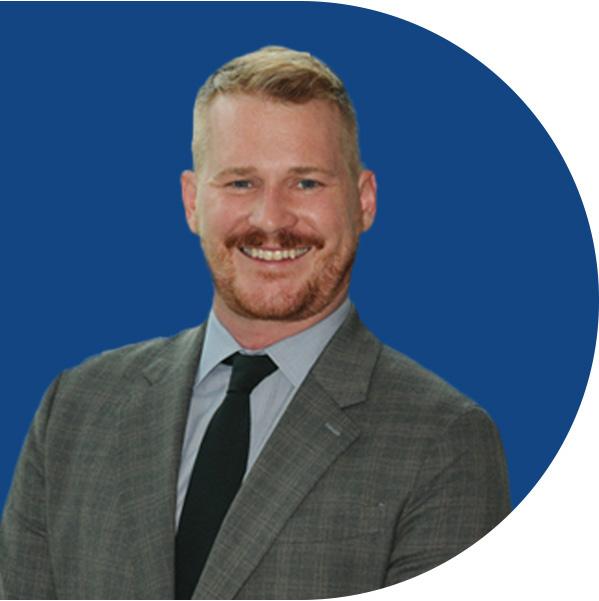
Meet Our Wespath Expert
Lucas Schoeppner Director, Sustainable Investment Stewardship Joined Wespath: April 2023
Lucas manages investment engagement activities at Wespath and supports efforts to integrate sustainability-related risk considerations into the asset manager selection and decision-making process.
Fun fact: Lucas was selected for the Fulbright “U.S. Young Journalists" research grant in 2013 and spent a year in Germany covering the debate around the legalization of fracking in Europe.
A note from Lucas: Making progress on net-zero
In the last two Sustainable Investment Reports we have explained what the Net-Zero Asset Owner Alliance (Alliance) is and why we, and the other Alliance members, are committed to transitioning our investment portfolio to net-zero greenhouse gas emissions by 2050. In this edition of the Sustainable Investment Report, I’m excited to share more about how we are working to achieve the goal—and show our progress.
As you will see in this section, we are using all the engagement tools available to us as an asset owner to achieve our commitment—and in the process encouraging corporations, asset managers and policymakers to also move toward net-zero.
In 2023 and 2024, Wespath placed a particular emphasis on reducing methane emissions. While methane is a powerful greenhouse gas, it is possible for oil and gas companies to significantly reduce methane emissions quickly without a major impact on their bottom line. Not only did Wespath engage the largest U.S. oil and gas companies on the issue, but we also engaged policymakers and regulators.
What is net-zero?
“Put simply, net-zero means cutting greenhouse gas emissions to as close to zero as possible, with any remaining emissions re-absorbed from the atmosphere, by oceans and forests,” according to the United Methodist Interagency Just and Equitable NetZero Coalition webpage. Wespath helped found the Coalition and serves as co-chair of the group.
When we joined the Alliance, we set goals around engagement and intermediate emissions reductions for our portfolio on the path to net-zero. I am pleased to say we have met the engagement goals and exceeded the emissions reductions! I encourage you to keep reading to see how much progress we have made.

After Wespath engagement, Chevron
joins partnership to cut methane emissions
When Wespath and other Climate Action 100+ investors met with Chevron in January 2024, the investors once again urged Chevron to join the world’s premier program for oil and gas companies to measure, report and mitigate methane emissions.
Wespath had been calling on Chevron to join the program, the Oil & Gas Methane Partnership 2.0 (OGMP 2.0), for several years. At the end of the first quarter in 2024, Chevron announced it would do just that.
Chevron’s decision to join OGMP 2.0, which is operated by the United Nations Environment Programme, means the three largest U.S. oil and gas producers—ExxonMobil, Chevron and ConocoPhillips—are now members of OGMP 2.0. Wespath also contributed to engagements that urged ExxonMobil and ConocoPhillips to join OGMP 2.0.
Lucas Schoeppner, Wespath’s Director of Sustainable Investment Stewardship, said that in his opinion, the methane initiative has reached a tipping point with Chevron joining OGMP 2.0.
“Them joining and maybe being a little bit more of a skeptical voice of the structures as they are, is probably something that’s going to make that particular initiative even stronger,” Schoeppner said.
“ Them joining and maybe being a little bit more of a skeptical voice of the structures as they are, is probably something that’s going to make that particular initiative even stronger. ”
Wespath’s Lucas Schoeppner said
First Eagle Investment's Mimi Mayaki and Wespath’s Lucas Schoeppner joined The Energy Council in visiting an EQT Corporation’s natural gas wellsite in Southwestern Pennsylvania in 2023 to discuss methane tracking and emissions reduction, among other things.
What is Methane?
Methane is the primary component of natural gas, which is burned to generate electricity, heat homes and businesses, and cook food. It also is used to make many products like fertilizers, plastics, and medical supplies like I.V. lines and bags.
Methane is also a powerful greenhouse gas. Humancaused emissions of methane, including equipment leaks and directly releasing natural gas into the atmosphere (also called venting), drive roughly one-third of current global warming.
Yet, methane can also be a source of hope amid efforts to limit climate change. Using the technology available today, an estimated 75% of the oil and gas industry’s methane emissions can be mitigated by 2030, according to OGMP 2.0. Additionally, OGMP 2.0 notes that a significant share of those emission reductions can be achieved at little to no net cost to the corporations because they can sell the natural gas that otherwise would have been wasted.
What is OGMP 2.0?
OGMP launched in 2014, and six years later it increased its scope and ambition (and added the 2.0 to its name). OGMP 2.0 has prompted oil and gas companies to shift from estimates of methane emissions to credible measured data—and helped companies reduce methane emissions in their operations.

Wespath engages federal regulators in support of proposed methane rules
Wespath wrote to U.S. government agencies in recent years in support of proposed rules for methane emissions.
In the third quarter of 2023, Wespath submitted a public comment letter to the Pipeline and Hazardous Materials Safety Administration of the Department of Transportation in support of their proposed rules on methane leaks. The proposal would be the most significant modernization of rules around natural gas pipeline leaks in the U.S. in decades.
Wespath also submitted public comments in the first quarter of 2024 in favor of the Environmental Protection Agency’s proposal for a modest change on excess methane emissions from oil and gas producers.
Wespath’s Lucas Schoeppner joined The Energy Council in visiting an EQT Corporation’s natural gas wellsite in Southwestern Pennsylvania in 2023. Later that year, Wespath wrote to the Department of Transportation in support of new rules on methane leaks.

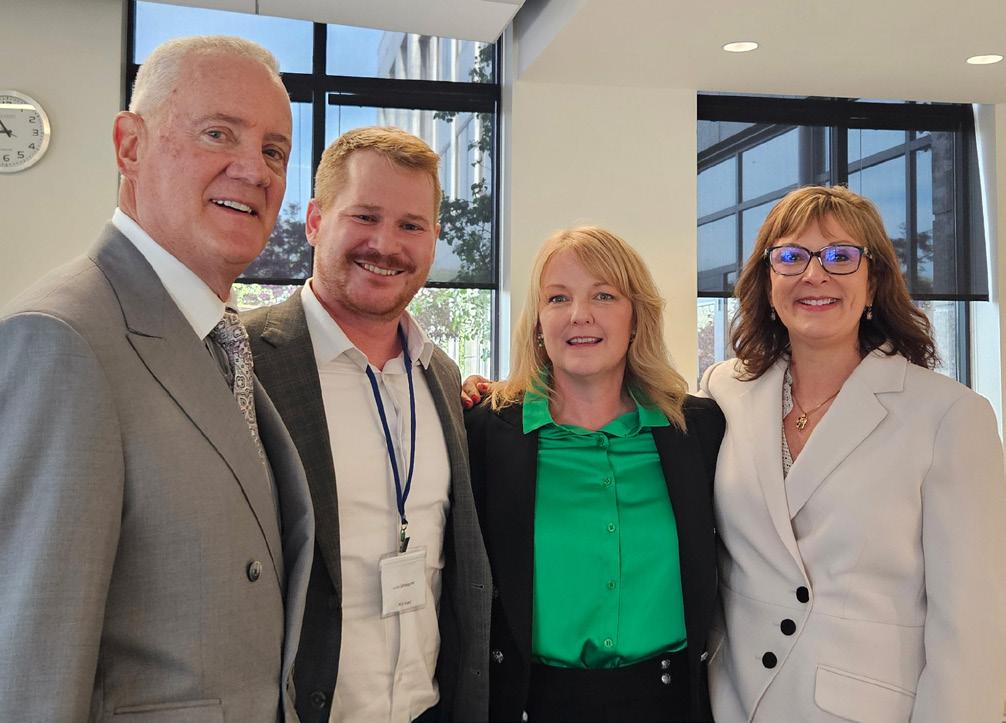

Wespath urges shareholders to vote against ExxonMobil directors
After U.S. oil and gas company ExxonMobil took an unprecedented step to suppress investor rights, Wespath challenged the company’s leadership.
The controversy began when two ExxonMobil investors— Arjuna Capital and Follow This—filed a shareholder resolution in 2024 asking the company to accelerate efforts to curb its greenhouse gas emissions. Instead of taking the traditional route of objecting to shareholder resolutions through the U.S. Securities and Exchange Commission (SEC), ExxonMobil filed a lawsuit against both investors.
This lawsuit drew national headlines and the attention of many investors, including Wespath.
“In my eyes, that’s a form of corporate bullying and intimidation,” Wespath CEO Andy Hendren wrote in a blog post.
In response, Wespath urged investors to vote against two of ExxonMobil’s board director nominees due to oversight of the company’s hostile treatment of shareholders and co-filed with Mercy Investment Services a notice of exempt solicitation with the SEC.
Proxy Voting Overview
Proxy voting
Voting as a shareholder on items at the Annual General Meetings (AGMs) of the companies in which we invest. All shareholders can participate in AGMs and vote on shareholder resolutions, board director nominations and other corporate governance topics.
“ In my eyes, that’s a form of corporate bullying and intimidation.
Wespath’s Andy Hendren wrote in a blog post
Many investors shared these concerns. One of the directors named in the exempt solicitation was Joseph L. Hooley. Compared to the 2023 proxy season, Hooley’s support ranked in the bottom 10% of all director candidates from S&P 500 companies, based on data published by shareholder engagement consultant Georgeson.
“Wespath is encouraged that we have not seen a continuation of this aggressive behavior by Exxon or other investors,” Wespath’s Lucas Schoeppner said.
Shareholder resolution
A formal, nonbinding proposal submitted by a company’s shareholder(s). A resolution is usually focused on a shareholder’s suggestion for how a company can improve its corporate governance or better address a particular topic, including sustainability issues.
Notice of Exempt Solicitation
Filing a form with the U.S. Securities and Exchange Commission (SEC) providing notice of a solicitation related to a proxy statement that is exempt pursuant to SEC rules with respect to a communication of information to a public company’s shareholders.
Sharing best practices to help institutional investors achieve net-zero
Back in 2022, Wespath’s Jake Barnett helped write The Future of Investor Engagement, a paper arguing asset owners would be best served by using new types of engagement— not solely the traditional corporate engagement—to address climate risk.
The Future of Investor Engagement, which was published by the United Nations-convened Net-Zero Asset Owner Alliance (Alliance), advocated that asset owners like Wespath should engage their asset managers, in particular, on climate topics.
The paper has influenced how investors within and beyond the Alliance think about engagement. It has been cited in shareholder resolutions, academic papers and trade magazine articles.
When the calendar flipped to 2023, Barnett expounded on the new types of engagement, articulating best practices for public policy engagement and asset manager engagement, among other things. In all, Barnett contributed to a total of five more publications in 2023 and 2024 for the Alliance.
What is an asset owner and what is an asset manager?
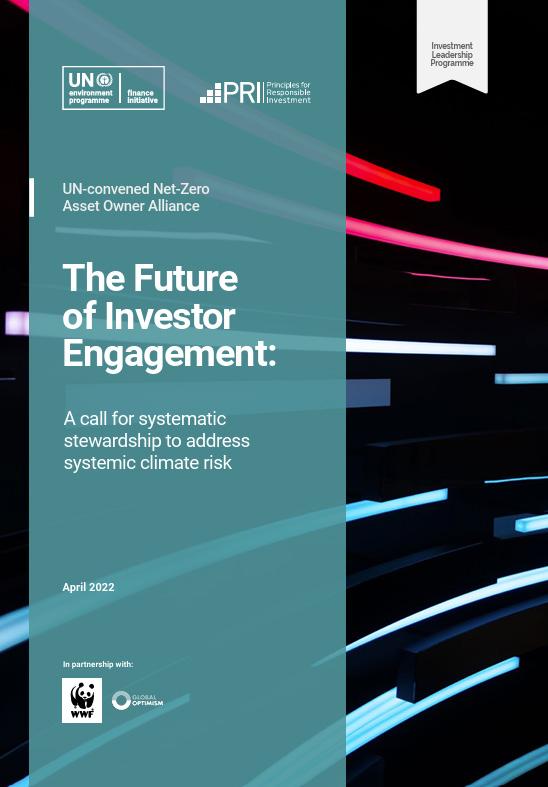
Asset owners: Own or are entrusted with financial assets—usually with a specific goal in mind, like funding retirement payments or maintaining an endowment. Individuals, governments, pension funds, endowments and insurance companies can all be asset owners.
Asset managers: Invest financial assets on behalf of asset owners. For example, Wespath works with dozens of asset managers that each provide different skills and expertise to help us achieve a globally diversified portfolio.
What is the Net-Zero Asset Owner Alliance?
The Alliance is a group of 88 asset owners (i.e., pension funds, insurers and endowments), with $9.5 trillion combined assets under management as of October 2024, committed to transitioning their investment portfolios to net-zero greenhouse gas emissions by 2050.
Net-Zero Asset Owner Alliance publications Wespath staff contributed to in 2023-24
Overview
Position on the Oil and Gas Sector
Outlines concrete steps and strategies to encourage necessary changes within fossil fuel companies to support a transition to a net-zero future.
Aligning Climate Policy Engagement with Net-Zero Commitments
Highlights best practices for asset owners to evaluate and engage asset managers on their policy engagement related to climate.
Elevating Asset Manager Net-Zero Engagement Strategies
Calls on asset managers to adopt a consistent, transparent and outcomes-oriented climate engagement strategy, which recognizes that climate change poses systemic risks to asset owner portfolio returns.
Policy Engagement Guidelines
Outlines principles for asset owners for active and constructive engagement within public policy debates to support net-zero greenhouse gas emissions by 2050.
Serving Asset Owner Clients through Climate Stewardship
Summarizes the Alliance’s expectations of asset managers, which are critical partners in helping asset owners address climate-related risks and opportunities.
Net-Zero Asset Owner Alliance Goals
Goal:
Co-lead four company engagements through the Climate Action 100+ initiative.
Achieved:
Led or co-led four corporate engagements: EQT, Chevron, Occidental, WEC Energy
Goal:
Reduce emissions intensity of its investments funds by 35% by 2025 compared to Sept. 2018 baseline.
New Net-Zero Asset Owner Alliance interim goal
After Wespath exceeded its goal of reducing the carbon intensity of its investment funds by 35% from October 2018 levels by 2025, Wespath has set a new 2030 interim goal of a further 20% reduction from its October 2018 baseline via shareholder engagement, asset manager engagement and transition finance.
Achieved:
Approximately 48% drop in emissions intensity, 53% drop in absolute emissions as of December 31, 2024.
Wespath funds’ emissions intensity*
Carbon footprinting: absolute or intensity?
Not all carbon footprint metrics are made the same— it is important to recognize the difference between absolute emissions and emissions intensity:
• Absolute emissions:
The total amount of emissions generated by a company. For Scope 1 and Scope 2 emissions, this covers direct emissions from sources owned or controlled by a company, and indirect emissions created by things like purchased electricity, heating and cooling.
• Emissions intensity:
An efficiency metric that adjusts total emissions based on an economic amount. For example, one might look at the amount of emissions generated by a company per unit sold or per dollars of revenue.
Both absolute and intensity-based measurements are relevant when calculating the carbon footprint of investment funds. For the purposes of setting targets to reduce Wespath’s funds’ emissions, we opted for a revenue-based intensity metric that accounts for the size of the funds’ holdings in companies and their emissions created per $1 million in revenue.
Absolute:
“We generated X amount of emissions”
Intensity:
“We generated X amount of emissions per million dollars of revenue created”
This approach helps us see whether companies are becoming more efficient over time by generating more revenue while working to reduce their carbon footprint.
What are Scope 1, 2 and 3 emissions?
Scope 1 and 2 emissions can be thought of as emissions that a company owns or controls. More specifically, Scope 1 emissions are greenhouse gas emissions caused by things like a company’s furnaces and vehicles. Scope 2 emissions are greenhouse gas emissions linked to a company’s purchase of electricity and other energy sources for heating and cooling. Scope 3 emissions are the result of a company’s activities. Scope 3 emissions often represent the majority of an organization’s greenhouse gas footprint and include emissions resulting from the use and disposal of a business’ products and services.
Engagement is the primary mechanism Wespath uses to address sustainable investment issues. In the case of climate change, this means that Wespath pays close attention to risks and opportunities associated with climate change, and speaks to its managers routinely about the topic. However, Wespath does not allocate capital specifically or solely for the purposes of lowering carbon intensity. Instead, Wespath seeks to engage with corporations, asset managers and policymakers to decarbonize the real economy in a manner that is aligned with Wespath’s long-term economic interests and the value of caring for creation, which Wespath is called to consider as a United Methodist institution.
Wespath joins coalition working to tackle nature loss
Wespath was an inaugural member of the first global investor engagement initiative seeking to address nature and biodiversity loss around the planet. The initiative, Nature Action 100, kicked off its corporate engagements by writing letters to 100 companies in the third quarter of 2023.
In the first quarter of 2024, Wespath initiated a Nature Action 100 engagement with Packaging Corporation of America, which is part of the S&P 500 and one of the largest producers of containerboard and corrugated packaging products in the U.S.
What is biodiversity—and why does it matter to investors?
Biodiversity refers to the variety of life on Earth, in all forms, ranging from bacteria to entire ecosystems such as forests. Biodiversity provides many of the resources that humans need to survive, including food, water, medicine, a stable climate and economic growth, according to the United Nations (U.N.).
Three stats help explain the economic importance of biodiversity:
Over half of the world’s gross domestic product is reliant on nature and its services, as estimated by the World Bank.
What is Nature Action 100?
More than 1 billion people rely on forests for their subsistence, livelihood, employment and income, per the U.N.
More than half of all carbon emissions are absorbed by land and ocean.
Nature Action 100 is a global investor-led engagement initiative that aims to support greater corporate ambition and action on reversing nature and biodiversity loss by 2030. Investors are engaging 100 companies in eight key sectors, including biotechnology and pharmaceuticals; chemicals; and forestry and packaging.
Nature Action 100 had more than 230 investor participants, who collectively have over $30 trillion in assets under management or advice, as of October 28, 2024.
How were the 100 companies chosen?
Nature Action 100 investors identified 100 companies in eight key sectors to engage with under the initiative.
The eight sectors are biotechnology and pharmaceuticals; chemicals; household and personal goods; consumer goods retail; food (ranging from meat and dairy producers to processed foods); food and beverage retail; forestry and packaging; and metals and mining.
The following guidelines were used to identify the 100 companies:
• The company is within one of the key sectors deemed to be systemically important in reversing nature loss.
• An analysis conducted by the Finance for Biodiversity Foundation indicates the company has a high potential impact on nature.
• The company has a large market capitalization within the sector.
• The selected companies represent developed and emerging markets.

2025 and Beyond
Engaging with Packaging Corporation of America
Wespath’s Lucas Schoeppner (second from left) attended Packaging Corporation of America’s 2025 shareholder meeting and met (from left) Mark Kowlzan, chairman and CEO; Monica Hughes, senior director of corporate sustainability and ESG; and Darla Olivier, senior vice president for tax, ESG and government affairs.
As part of a Nature Action 100 engagement, Wespath’s Lucas Schoeppner attended Packaging Corporation of America’s 2025 shareholder meeting in suburban Chicago. During the visit, Schoeppner met with the company’s CEO and the head of the board’s Sustainability Committee. Schoeppner addressed the board and shareholders during the meeting to explain Nature Action 100’s work. Representatives from Nature Action 100 plan to meet with the company’s carbon neutrality team.
Impact Investing
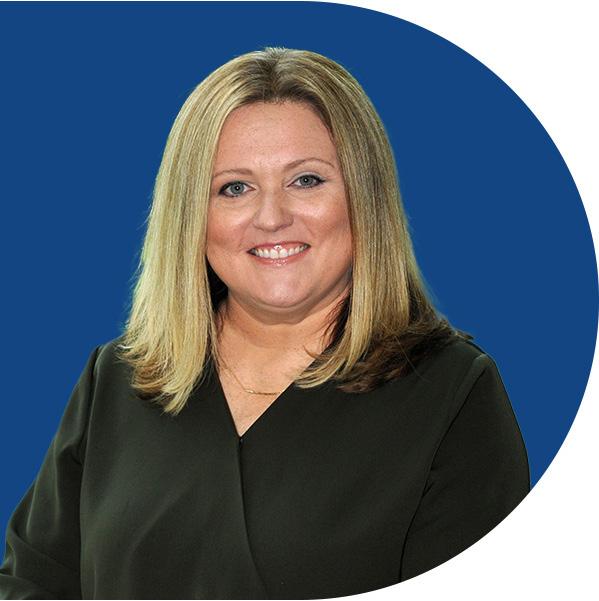
Sylvia Poniecki Director, Impact Investments
Joined Wespath: September 2011
Sylvia plays a key role in overseeing the strategic and managerial aspects of Wespath’s internally managed PSP Lending Program. She is responsible for evaluating transactions, monitoring performance and providing comprehensive support for initiatives that drive the program’s success.
Fun fact: Sylvia has a passion for sports photography. Through her lens, she has documented her daughters’ athletic achievements over the years and captured many special moments.
A note from Sylvia: Building for a brighter tomorrow
The Positive Social Purpose (PSP) Lending Program underscores Wespath’s role in financing impactful projects that seamlessly align financial returns with social benefits. Since its inception in 1990, the PSP Lending Program has invested more than $2 billion in U.S. affordable housing and community development. Additionally, the program has supported global microfinance and renewable energy initiatives.
Access to affordable housing is a cornerstone of thriving, equitable communities. Across the U.S., rising costs, limited supply and systemic barriers continue to make housing unattainable for many. Low-income families, seniors and vulnerable populations are disproportionately affected, facing uncertainty and instability in their search for safe, secure housing. Tackling these challenges requires innovative financing mechanisms, strengthened public-private partnerships and a steadfast commitment to policies that prioritize housing accessibility.
In 2025, we proudly celebrate 35 years of the PSP Lending Program, which reflects decades of investments dedicated to strengthening communities.
What is impact investing?
Wespath defines impact investing as investments that seek to strengthen local and global communities while earning market rates of return commensurate with risk. Wespath’s most well-known impact investment program is the PSP Lending Program.
Wespath’s Private Market Impact Investments
As of December 31, 2024.

Wespath’s PSP Lending Program helps address the need for affordable housing
The longstanding shortage of affordable rental housing in the U.S. is staggering and heartbreaking.
There is neither a state nor a major metropolitan area in the country that has enough affordable housing for the lowestincome renters, according to the National Low Income Housing Coalition (NLIHC). The lowest-income renters have incomes at or below either the federal poverty guideline or 30% of their area median income, whichever is greater.
The U.S. has 10.9 million extremely low-income renter households, and there is a shortage of 7.1 million affordable and available rental homes, according to NLIHC.
Wespath’s PSP Lending Program has been helping to address the affordable housing issue since 1990 while also fulfilling Wespath’s fiduciary duty.
The PSP Lending Program since its launch
More than $2.0 billion invested in U.S. affordable housing
Over 54,000 units created or preserved
Investments in all 50 states
(From left) Cinnaire’s Trey Phillips, Cinnaire’s Bernardo Sanchez, Wespath’s Sylvia Poniecki, Cinnaire’s Mark Stay, property manager Chery Pearson, property maintenance technician Calvin Clinkscales and Wespath’s Johara Farhadieh pose for a photo during Sylvia and Johara’s visit to Broadview Senior Apartments.
PSP Lending Program Overview as
of December 31, 2024
Since its inception on June 1, 1990, the PSP Lending Program strategy has delivered market-rate, risk-adjusted returns.
Gross-of-Fees Annualized Return for the PSP Lending Program1
PSP Aggregate Benchmark Annualized Return2
Annualized Return for the Bloomberg U.S. Aggregate Index3
PSP Lending Program Areas of Focus

Community development projects
Global microfinance investments across four continents Creating
1 Historical returns are not indicative of future performance. The PSP Lending Program performance is gross-of-fees. Inclusion of these fees would result in lower performance. PSP Lending Program strategies are not available for direct investment but rather are held within applicable P Series or I Series funds. Performance reflects that of the PSP Lending Program composite employed by: (a) Wespath Institutional Investments through the I Series funds available as of January 1, 2019; and (b) UMC Benefit Board, Inc., an affiliated entity, through the P Series funds prior to January 1, 2019. After January 1, 2019 the composite includes both the applicable P Series funds and I Series funds (asset-weighted). For more information about the P Series and I Series funds, including their historical net-of-fees performance, please see the Investment Funds Description – P Series and Investment Funds Description – I Series, respectively.
2 The benchmark is the Bloomberg U.S. Agency CMBS Index, +150 basis points, as of January 1, 2018. From January 1, 2016, to December 31, 2017, the benchmark was 50% Bloomberg U.S. Aggregate – Long (A) Index and 50% Bloomberg U.S. Universal ex-MBS Index. From January 1, 2007, to December 31, 2015, the benchmark was 60% Bloomberg U.S. Universal ex-MBS Index, 25% Bloomberg U.S. Long Credit A Index and 15% Bloomberg Credit 1 – 5 Years Index. From January 1, 1992, to December 31, 2006, the benchmark was the Lehman Agency Non-Callable Index. Prior to January 1, 1992, the benchmark was the U.S. Consumer Price Index, +200 basis points.
3 The Bloomberg U.S. Aggregate Bond Index measures the investment grade, U.S. dollar-denominated, fixed-rate taxable bond market. This broad-based index is a widely used proxy for the performance of the U.S. fixed income market and is shown for illustrative purposes only. The Bloomberg U.S. Aggregate Bond Index is not the PSP Lending Program’s performance benchmark and is not used to determine whether the program achieved its investment objective.
PSP Lending Program highlight: West End Heights
The West End Heights development in Ithaca, New York, has 60 one-bedroom apartments, including 38 apartments designated for individuals served by Lakeview Health Services, a local not-for-profit agency. Lakeview Health Services has offices on the ground floor of the five-story building.
Lakeview Health Services offers residential programs at West End Heights to support individuals who are vulnerable due to mental illness. The agency also provides support services to West End Heights residents who are exiting homelessness, coping with substance use disorder or have HIV/AIDS. The other 22 apartments are reserved for individuals earning up to 60% of the area median income.
West End Heights features fossil fuel-free, electric heat pumps to heat and cool residences and community spaces. Ithaca has committed to decarbonize all the city’s buildings by 2030, and West End Heights is a step in that direction. All apartments have Energy Star kitchen appliances, and the building is LEED (Leadership in Energy and Environmental Design) Certified.
Community Preservation Corporation is the qualified lending partner, or intermediary, on the development. Intermediaries help assemble the financing packages for affordable housing projects. They also service loans and provide guarantees and credit enhancements on the loans they bring to Wespath to invest in.
West End Heights
• Ithaca, New York
• 60 apartments
• Loan: Over $1.8 million
• Intermediary: Community Preservation Corporation
• Wespath loan closing date: April 2023
63% supportive apartments 37% rent-restricted




Photos courtesy of Community Preservation Corporation.
PSP Lending Program highlight: Broadview Senior Apartments
Many seniors want to “age in place,” meaning they want to live independently in a comfortable home in the community where they put down roots. Broadview Senior Apartments allows residents of Broadview, Illinois, to do just that.
The village of Broadview saw a critical need for affordable housing for local seniors and veterans and donated the land for the project in suburban Chicago. Residences are restricted to households 55 and older earning up to 60% of the area median income (AMI). Of the 70 units, 18 are subsidized under a rental assistance program for individuals with an extremely low income (30% or less of AMI).
Broadview Senior Apartments features high-efficiency heating and cooling systems, and the building’s exterior walls and roof were constructed to minimize air leakage, which will reduce heating and cooling costs. The project earned the National Green Building Standard Bronze level.
Learn More
Scan the QR code:
Watch a video recapping the tour Wespath CIO Johara Farhadieh and Director of Impact
Investments Sylvia Poniecki took of Broadview
Senior Apartments.

Broadview Senior Apartments
• Broadview, Illinois
• 70 apartments for seniors
• Loan: Over $1.9 million
• Intermediary: Cinnaire
• Wespath loan closing date: February 2023



Photos courtesy of Cinnaire.

PSP Lending Program highlight: Thirteen31 Place Apartments
At Thirteen31 Place Apartments, residents have not only a place to call home in Milwaukee, but also a built-in support system. Lutheran Social Services of Wisconsin and Upper Michigan provides residents case management services to access:
Rehabilitation, vocational and employment assistance
General health services (medical and behavioral)
Income support and benefits
Consumer and family support
Thirteen31 Place Apartments includes one-, two- and three-bedroom apartments. Of the 89 units, 74 are reserved for families earning up to 60% of the area median income. Units include in-unit washers and dryers and free high-speed internet access.
“For Thirteen31 Apartments, its presence serves as an anchor of revitalization in a neighborhood previously ignored by investment and is a symbol to the city of Milwaukee,” said Mark Stay, senior loan portfolio manager with intermediary Cinnaire.
“ ”
For Thirteen31 Apartments, its presence serves as an anchor of revitalization in a neighborhood previously ignored by investment and is a symbol to the city of Milwaukee.
Cinnaire’s Mark Stay said
Thirteen31 Place Apartments
• Milwaukee
• 89 apartments
• Loan: Over $4.5 million
• Intermediary: Cinnaire
• Wespath loan closing date: February 2023




Apartments
Apartments
Find a PSP Lending Program property near you
Wespath’s PSP Lending Program has invested in properties in all 50 U.S. states. Scan the QR code to check out our interactive PSP property map to find out if there is one in your community.

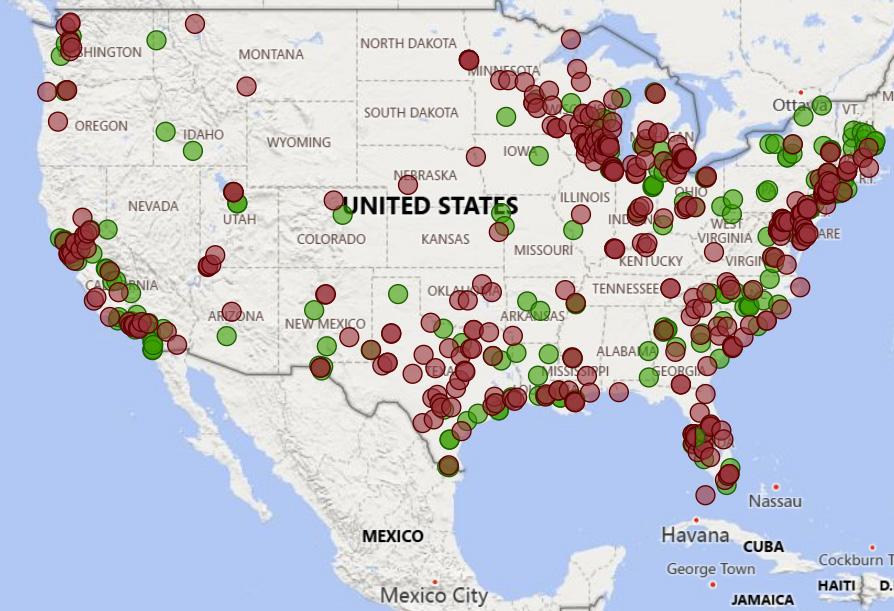

Current PSP Loan Repaid PSP Loan
How does Wespath invest in affordable housing?
Most PSP Lending Program properties are supported under the Low-Income Housing Tax Credit (LIHTC) program. The LIHTC program is the federal government’s primary tool for supporting the development and preservation of affordable housing across the country. It serves families, veterans, seniors, individuals with disabilities and those experiencing homelessness.
The LIHTC program is a public-private partnership that offers incentives to affordable housing developers and investors.
Once a development is allocated tax credits, the developer can either use the credit to offset their own tax liability or, as is more often the case, sell the rights to the tax credits to another entity. Large corporations, banks and insurance companies are among the entities that purchase LIHTCs.
The proceeds from the tax credit sale are then used to build the affordable housing development. Development costs that exceed the amount of funds received from the tax credit sale are funded by mortgages, local grants, subsidies and the equity invested by the developer.
The demand from investors (or developers) for an allocation of LIHTCs almost always exceeds the allocation of LIHTCs available each year. Competition is high and often requires that a project wait for several years to receive an allocation of tax credits.
Because the LIHTC program is so competitive, and because the allocation process is so thorough, only the strongest projects are awarded credits. This means LIHTC projects tend to have strong underwriting and oversight, which, in turn, benefits investors like Wespath because these projects typically have low default rates and reliable long-term performance.
In other words, the LIHTC program enables Wespath to pursue strong investment returns for our stakeholders while simultaneously supporting the development of safe, affordable rental housing in local communities.
LIHTC Program
Since 1986, the LIHTC program has:
Produced $716 billion in wages and income
Served nearly 9 million households
According to a November 20, 2024, summary by the Affordable Housing Tax Credit Coalition.
Wespath invests with nonprofit that helps lend to Southern Africa businesses
The PSP Lending Program also provides or helps facilitate microfinance loans to individuals in developing regions around the globe who have little or no access to traditional financial services.
Wespath provided loans to Shared Interest, a nonprofit that supports economic development in Southern Africa, for many years. Shared Interest provides loan guarantees to Southern African banks, which serves as a catalyst for them to lend to Black entrepreneurs, small and growing businesses, farmers and co-ops, microfinance institutions, and low- cost housing and infrastructure providers.
In 2024, Wespath reaffirmed its commitment, making a $5 million loan to be deployed over the next few years. The loan is an investment in both the Fixed Income Fund – P Series and the Fixed Income Fund – I Series.
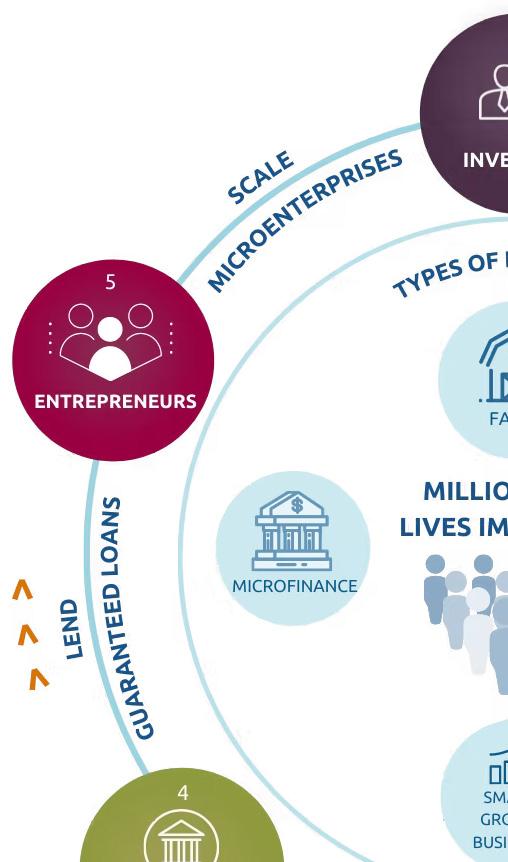
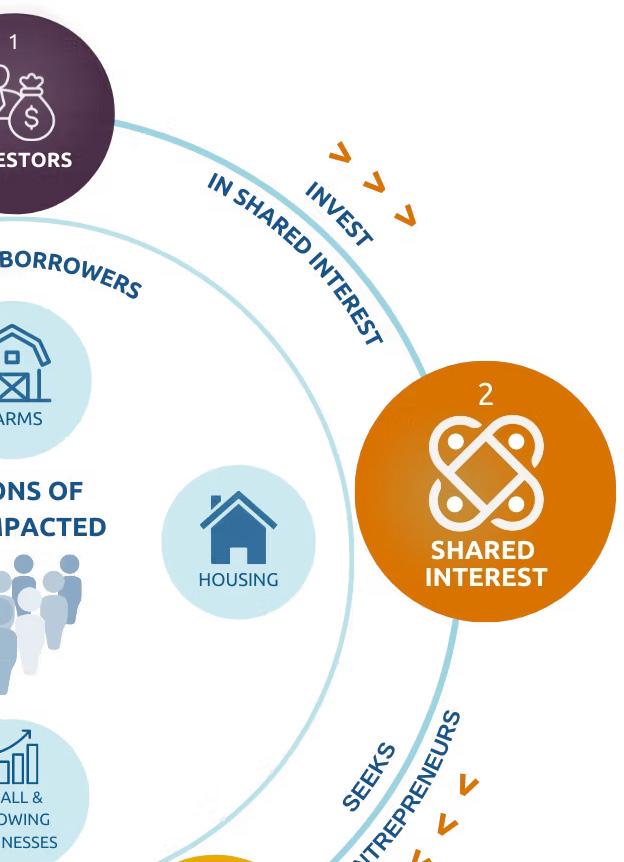

What is a loan guarantee?
A loan guarantee is a commitment by a third party, in this case Shared Interest, to cover a designated percentage of the risks associated with a loan to a borrower, who does not have sufficient bank-worthy collateral.
Shared Interest’s partnership with Sihlangene Bus Company in South Africa illustrates how the model works. Sihlangene, a Black and female co-operative, needed a loan to purchase 24 buses so it could operate a rural route awarded by the government. Shared Interest provided a 40% loan guarantee to the lender, which made it so the lender was willing to make the loan. Sihlangene repaid its loan of $1.7 million in less than three years. The loan helped create 55 new jobs.
What is Shared Interest?
Shared Interest was established in 1994 by U.S. antiapartheid activists and socially responsible investors who were committed to ending apartheid in South Africa. Since its founding, Shared Interest has provided $34 million in loan guarantees, supporting more than 2 million people and unlocking $131 million in lending. Shared Interest has recently expanded beyond South Africa to include Eswatini, Malawi, Mozambique and Zambia.
What is a microfinance loan?
Typically, these are loans of between $50 and $300. These loans provide much needed capital to individuals or small businesses to scale their businesses and create a consistent source of income for themselves or their families.
Wespath data dashboard a one-stop shop for sustainable investment analysis
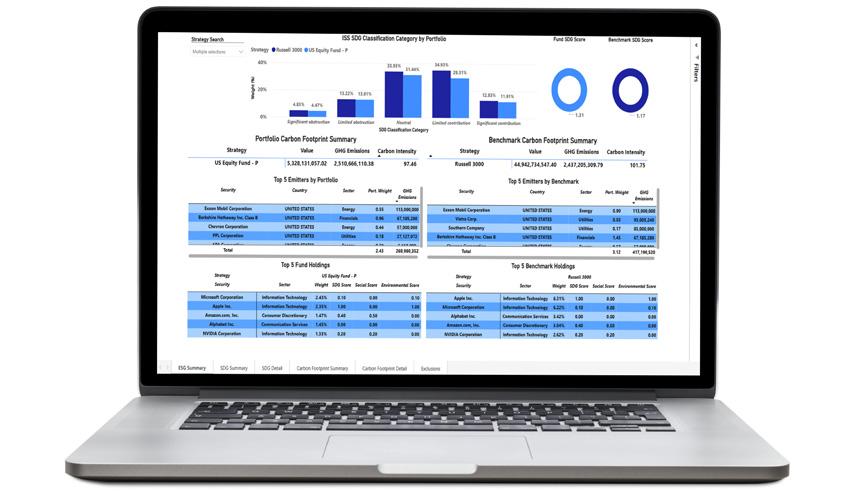
In just two years, Wespath’s proprietary Impact Measurement and Management (IMM) tool grew into a comprehensive data dashboard for a majority of Wespath’s sustainable investing metrics for both public equity and fixed income funds.
When the IMM tool was created in 2022, it helped Wespath assess how well its public equity funds aligned with the United Nations Sustainable Development Goals (SDGs). The SDGs represent 17 goals that seek to tackle sustainable global development and long-term economic growth while providing a hopeful vision for the future. No poverty, quality education, gender equality, and affordable and clean energy are just a few of the goals.
From the start, Wespath staff could use the IMM tool to see the companies in a fund that contributed to—and detracted from—SDG alignment. Team members also could compare the SDG alignment of a specific asset manager strategy with its benchmark.
In 2023 and 2024, Wespath staff kept enhancing the IMM tool. It now provides data analysis of many of the fixed income funds in both the P Series and the I Series. More recently, annual carbon data analysis and sustainabilityrelated financial risk investment exclusions information was added to the IMM tool.
Sharing the IMM tool with a wider audience
Wespath Senior Analyst Jon Strieter shared his experiences and insights from creating the IMM tool at an impact investing conference for institutional investors.
Strieter (second from right in top photo) was one of four panelists for a session titled “How Do You Measure and Define Successful Impact?” at Impact Summit America in October 2023. The event was hosted by Phenix Capital Group at The Yale Club of New York City.
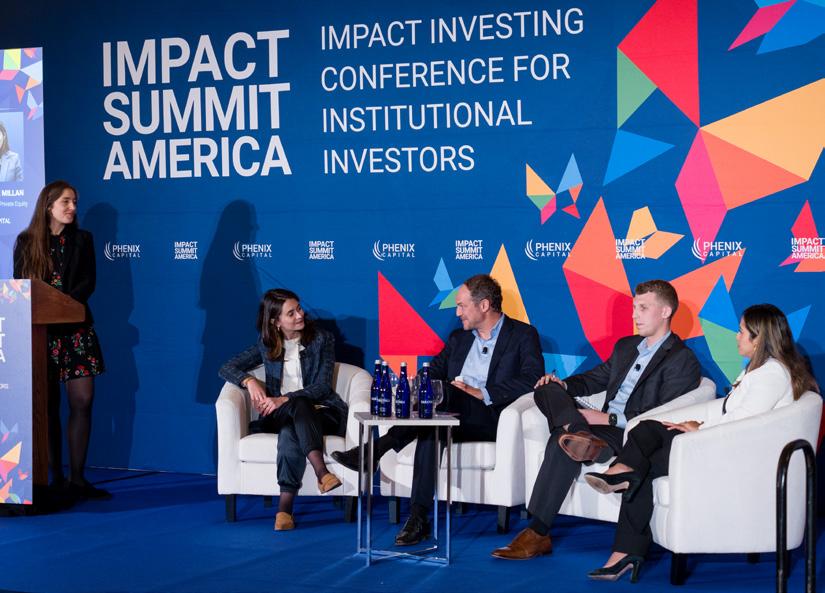
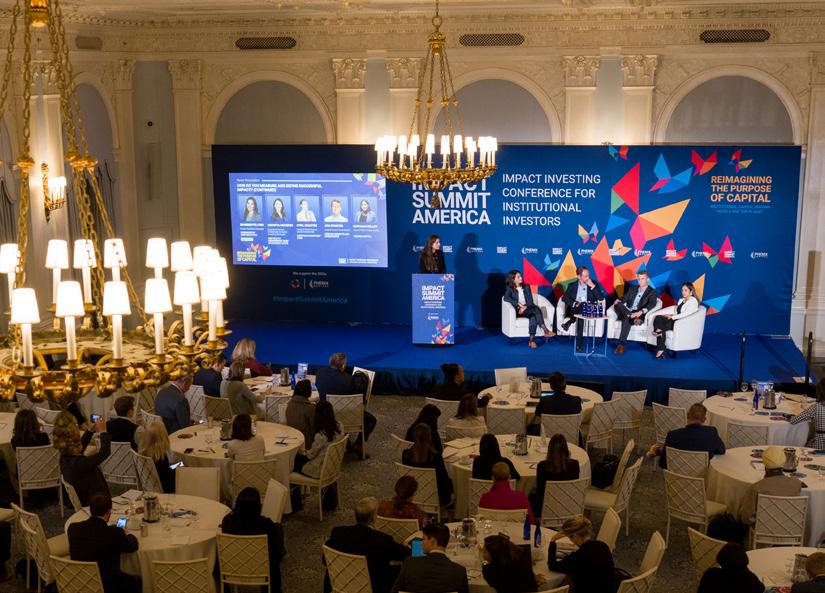
Explore the IMM tool
The screen grabs below from the IMM tool shows how Wespath’s U.S. Equity Fund – P Series, available to participants and plan sponsors, compares to its benchmark, the Russell 3000, in a couple of sustainable investment categories. To help explain the IMM tool, Wespath’s Jon Strieter created a brief, simple walkthrough highlighting how the IMM tool works—and the insights that can be gleaned from it.
Wespath Fund SDG Score Benchmark SDG Score
1.
The IMM tool shows two overall scores, which reflect how well the U.S. Equity Fund – P Series and its benchmark align with the 17 SDGs. It’s a positive indicator that the Wespath fund is outperforming its benchmark in sustainability alignment.
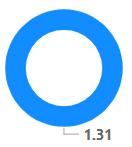

2.
You can view the distribution of securities held in the fund compared to its benchmark, ranging from those that significantly obstruct the SDGs to those that strongly contribute to them.

3.
The IMM tool also shows the top five greenhouse gas (GHG) emitters within the U.S. Equity Fund – P Series, along with the amount of GHG emissions each company produces.

2025 and Beyond
Creating a standalone PSP Lending Fund
Wespath is exploring multiple ways to give institutional investors additional opportunities to invest in the PSP Lending Program. For instance, Wespath is considering adding PSP Lending Fund assets and investments to the Social Values Choice Bond Fund – I Series for institutional investors. Wespath is also looking to grow the PSP Lending Program investment pipeline so it can offer clients more investment opportunities.
Wespath looking to add lending partners
To maintain a strong pipeline of affordable housing project investments, Wespath is working to expand the list of qualified lending partners (intermediaries) it works with.
Governance

Meet Our Wespath Expert
Lucas Schoeppner Director, Sustainable Investment Stewardship
Joined Wespath: April 2023
Lucas manages investment engagement activities at Wespath and supports efforts to integrate risk consideration into the investment selection and decision-making process.
Fun fact: Lucas helped start a mission-based clothing factory in Lowell, Massachusetts, which focused on employing single mothers living below the poverty line. He was the resident sewing machine repairman, among other things.
A note from Lucas: Good governance, good outcomes
Addressing some of today’s most pressing sustainable investment challenges—including climate risk, human rights and workforce equity—requires more than good intentions. It requires strong corporate governance.
At Wespath, we believe that effective governance is critical to long-term value creation. When companies and asset managers have the right decisionmakers at the board and management level, they are better equipped to navigate risks, capitalize on opportunities and act in the best interests of their stakeholders.
This section highlights Wespath’s governance-focused engagements, including our work with the Midwest Investors Diversity Initiative and the Interfaith Center on Corporate Responsibility. These collaborations have led to tangible outcomes: transparency around workforce diversity and enhanced workplace safety standards. We’ve also engaged with some of the world’s largest financial institutions to advocate for stronger commitments to sustainable investing.
Our approach is grounded in both experience and evidence. Research consistently shows that diverse and well-governed organizations are more likely to outperform their peers. That’s why we continue to engage companies and asset managers on governance practices.

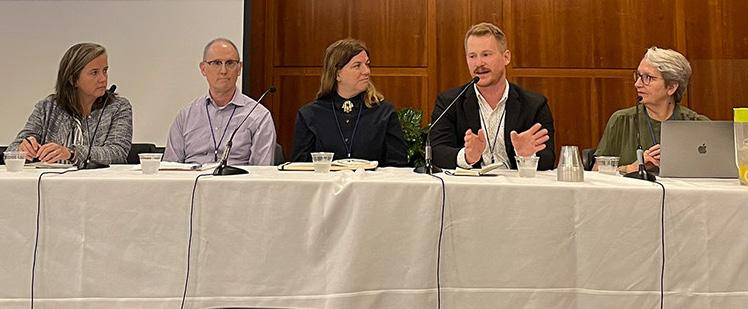
After Wespath engagement, asset manager changes proxy voting policy
A pair of discussions with one of Wespath’s asset managers demonstrated the power of engagement.
Wespath and a fellow member of the Midwest Investors Diversity Initiative (MIDI) met with the asset manager in the fourth quarter of 2023 to discuss the firm’s hiring practices and minority representation among its investment staff. Wespath and the other MIDI member encouraged the asset manager to provide greater disclosure of diversity metrics, such as making its Equal Employment Opportunity-1 (EEO-1) report public.
U.S. employers with 100 or more employees are required to submit the EEO-1 report, which details workforce demographics by race or ethnicity, sex and job category.
When the two groups met the following quarter, the asset manager shared that it changed its proxy voting policy for 2024 in response to the previous meeting. The manager’s policy now indicates potential support for shareholder proposals that seek disclosure of staff diversity-related metrics and board diversity information.
What is a proxy voting policy?
A proxy voting policy, sometimes called proxy voting guidelines, outlines how an investment firm or asset manager votes on behalf of its clients at shareholder meetings.
The policy may include procedures for researching, casting and disclosing votes on issues like board elections, executive compensation and shareholder proposals.
Wespath’s Lucas Schoeppner (center) spoke on multiple panels at the Interfaith Center on Corporate Responsibility’s 2023 Fall Conference. He discussed asset manager engagements on proxy voting, among other things.
What is MIDI?
As its name suggests, MIDI seeks to increase racial, ethnic and gender diversity on corporate boards and within workforces.
In recent years, Wespath has helped MIDI expand who it engages. MIDI has traditionally focused on corporate engagements, but the institutional investor initiative is now also engaging with members’ asset managers, thanks in part to Wespath’s suggestion.
When engaging an asset manager, MIDI discusses the firm’s diversity and diversity policies—as well as its engagements with corporations and its proxy voting practices related to diversity.
Wespath takes part in these engagements because we believe it is in our investors’ best interest. For instance, a 2023 report by the consulting firm McKinsey & Company found that companies with higher levels of diverse representation on executive teams have a higher likelihood to outperform peers, by as much as 39 percent in terms of profitability.
Engaging large asset managers
In 2023, Wespath and its MIDI colleagues met twice with BlackRock to discuss the firm’s approach to supporting diversity, equity and inclusion (DEI) throughout its workforce.
The discussion focused on pay equity, diverse representation among investment teams and senior management, and how BlackRock’s DEI efforts are different from its competitors.
Wespath was also part of a MIDI coalition that met with Fidelity Investments’ human resources, operations and investment teams in 2023 to discuss the firm’s diversity initiative and push for greater disclosure of diversity data amongst investment professionals at the firm.
The business case for diversity on executive teams and financial outperformance:
Women Representation
Top-quartile companies in women representation on executive teams had a 39 percent greater likelihood of financial outperformance versus their bottom-quartile peers.
Ethnic Diversity Representation
Top-quartile companies in ethnic diversity representation on executive teams had a 39 percent greater likelihood of financial outperformance versus their bottom-quartile peers.
MIDI by the numbers
MIDI is an alliance of 15 Midwest-based institutional investors, including Wespath, with more than $1 trillion combined in assets under management and advisement as of December 16, 2024.
MIDI members work collaboratively to engage smaller, Midwest-based companies that are typically not engaged by investors as often as large multinational firms. Below is a recap of MIDI’s corporate engagements.
2022-2023 and 2023-2024 Proxy Seasons
21 Companies engaged:
Companies that appointed or committed to appoint a diverse director
Companies that publicly disclosed their board diversity 21 of 21 2 of 21 12 of 21 16 of 21
Companies that adopted a diverse search policy
Companies that disclosed their Equal Employment Opportunity-1 (EEO-1) report
Since MIDI was launched in 2016
Companies engaged*: 91
Among MIDI-engaged companies that appointed new board directors, percentage of new directors that were women or people of color: 57 % * Since inception
Of the 77 companies engaged by MIDI since it launched that are still publicly traded:
99%
76 Adopted a diverse search policy
86%
66 Publicly disclose their board diversity
16%
12 Publicly disclose their EEO-1 report
Wespath collaborates with ICCR
Wespath staff and other ICCR members collaborated to engage both large financial firms and other publicly traded companies in recent years.
Wespath, ICCR push for sustainable investment commitments from large financial institutions
Wespath collaborated with other ICCR members and ICCR staff to coordinate meetings with large financial firms J.P. Morgan and State Street in 2023.
Wespath and peers from ICCR encouraged the asset managers to do what is in ICCR members’ best interests as long-term investors. ICCR members also voiced concerns regarding lower support for climate and diversity shareholder resolutions during the 2022-2023 proxy season.


Dollar stores make progress on working conditions following collaborative engagement

Retailers like Dollar General and Dollar Tree provide essential, low-cost goods, especially in underserved communities. However, workplace safety and staff wellbeing have been concerns at the retailers.
Throughout 2023 and 2024, Wespath and other ICCR members engaged Dollar Tree to discuss workplace safety and employee well-being. These engagements included constructive conversations around shareholder proposals, safety training programs and the company’s response to regulatory findings.
Dollar Tree demonstrated a willingness to collaborate with stakeholders, offering next steps and transparency around its internal efforts. The company reported a “refreshed approach” to social impact in 2024, noting that it hosted 12 community focus groups to “learn how to better support communities in safety, store conditions and product access.”
Wespath helped lead an engagement with Dollar General about workplace safety policies. A fellow investor subsequently filed a shareholder resolution in 2023 calling for an independent auditor to evaluate the company’s policies, which passed with majority support on the first attempt.
What is ICCR?
ICCR is a coalition of over 300 faith- and values-based institutional investors that collectively represent over $4 trillion in invested capital as of May 27, 2025. ICCR members engage hundreds of corporations annually on social and environmental issues that are critical to long-term value creation. Wespath’s Jake Barnett serves on the ICCR board and chairs the Governance committee.
The Breakfast Club… for sustainable investing professionals
Some sustainable investment professionals in Chicago realized they were spending more time on the coasts connecting with industry peers than in their own city, so in 2012 they began holding quarterly gatherings to network and share information with colleagues across the Chicago region.
Now over a decade later, the Chicago SRI-ESG Breakfast Group is still going strong, thanks in part to Wespath’s Lucas Schoeppner. He is one of five organizers of the get-together.
Each meeting features expert panelists discussing a sustainable investment theme. Topics in 2023 and 2024 included: carbon credits, ESG in the private equity ecosystem and how companies are approaching the realities of corporate commitments to sustainability.
From the beginning, organizers have sought to include “mainstream” investment professionals who are trying to figure out the sustainable investing world because of client demand or potential business opportunities. It is not just for investment professionals with a values-first perspective.
The Breakfast Group often has over 120 people in attendance, reflecting the growing interest in sustainable investing within Chicago’s investment community.
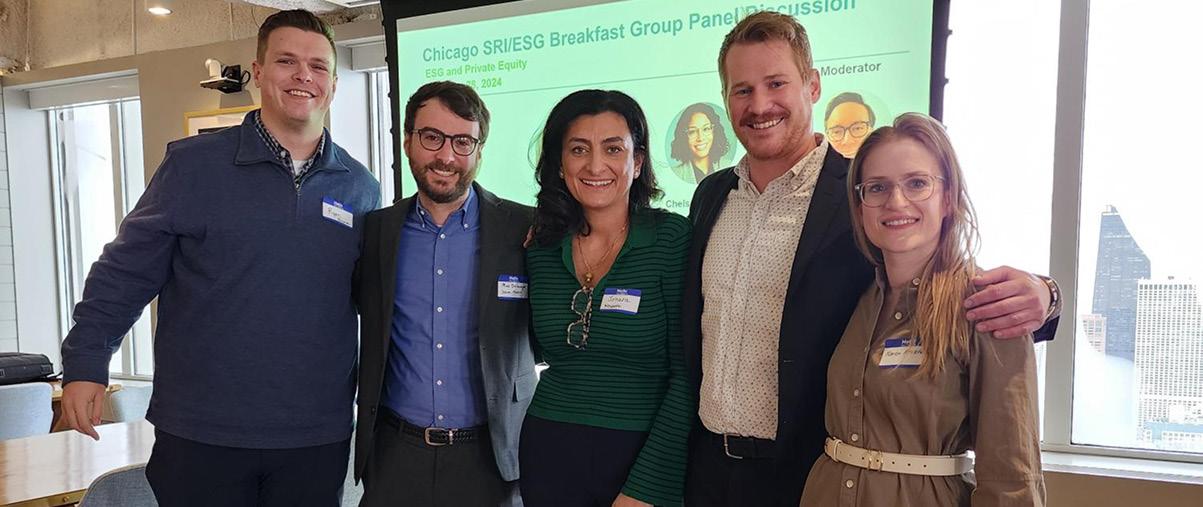
2025 and Beyond
Wespath engages with Walmart on DEI rollback Wespath has taken part in engagements with Walmart focused on the retailer’s rollback of diversity initiatives. Wespath CIO Johara Farhadieh joined an engagement call in 2025 and asked about Walmart’s rollback of programs supporting diverse suppliers. Farhadieh sought to highlight the importance of these programs for an inclusive economy. Wespath also signed an investor letter to Walmart in 2025, which expressed concern about the rollback of its diversity initiatives. The engagements with Walmart were led by Mercy Investment Services.
From left, Wespath’s Ryan McQueeney, Segal Marco Advisors’ Max Dulberger, Wespath’s Johara Farhadieh, Wespath’s Lucas Schoeppner and Office of the Illinois State Treasurer’s Karen Kerschke pose for a photo at the SRI-ESG Breakfast Group.
Human Rights

Jake Barnett
Managing Director, Sustainable Investment Strategies
Joined Wespath: January 2020
Jake leads a team that focuses on investment stewardship and sustainable investing. In addition, he interacts with key partners in the UMC, works to foster collaboration with the UMC and collaborates with colleagues across Wespath to prepare for General Conference.
Fun fact: During his prior job at Morgan Stanley’s Graystone Consulting, Barnett helped 16 congregations of Dominican nuns develop and launch the Climate Solutions Funds, which had both a private markets fund and a public markets fund. This was the first climate-impact focused fund launched by Morgan Stanley.
A note from Jake: Wespath on leading edge of assessing human rights risks to portfolio
The United Nations defines human rights as rights inherent to all human beings, including the right to life and liberty, freedom of opinion and expression, the right to work and education, the right to an adequate standard of living, the right to food, and many, many more.
In turn, the UMC Social Creed states a complementary perspective that, “We commit ourselves to the rights of men, women, children, youth, young adults, the aging, and people with disability; to improvement of the quality of life; and to the rights and dignity of all persons.”
When human rights are violated by a country or a company, or when companies operate in geographic areas where rights are in jeopardy, it can have an impact not only on people, but on the bottom line as well. I am proud that Wespath is at the forefront of assessing how human rights risks can adversely affect investment portfolios—and working hard to mitigate the most problematic risks among our investments.
Assessing and mitigating human rights risks is still a nascent field for investors. My team and I seek to keep this front of mind as we challenge ourselves to ask deeper questions rather than presuming we know all the answers. We have sought to learn as much as we can from others in the field.
In the coming years, I am confident Wespath will continue to advocate for human rights everywhere in practical, consistent, and ambitious ways. And, while we are certainly not equipped to solve all the world’s problems, if we help one additional individual to live a life of dignity with their rights respected, then that is work worth doing.
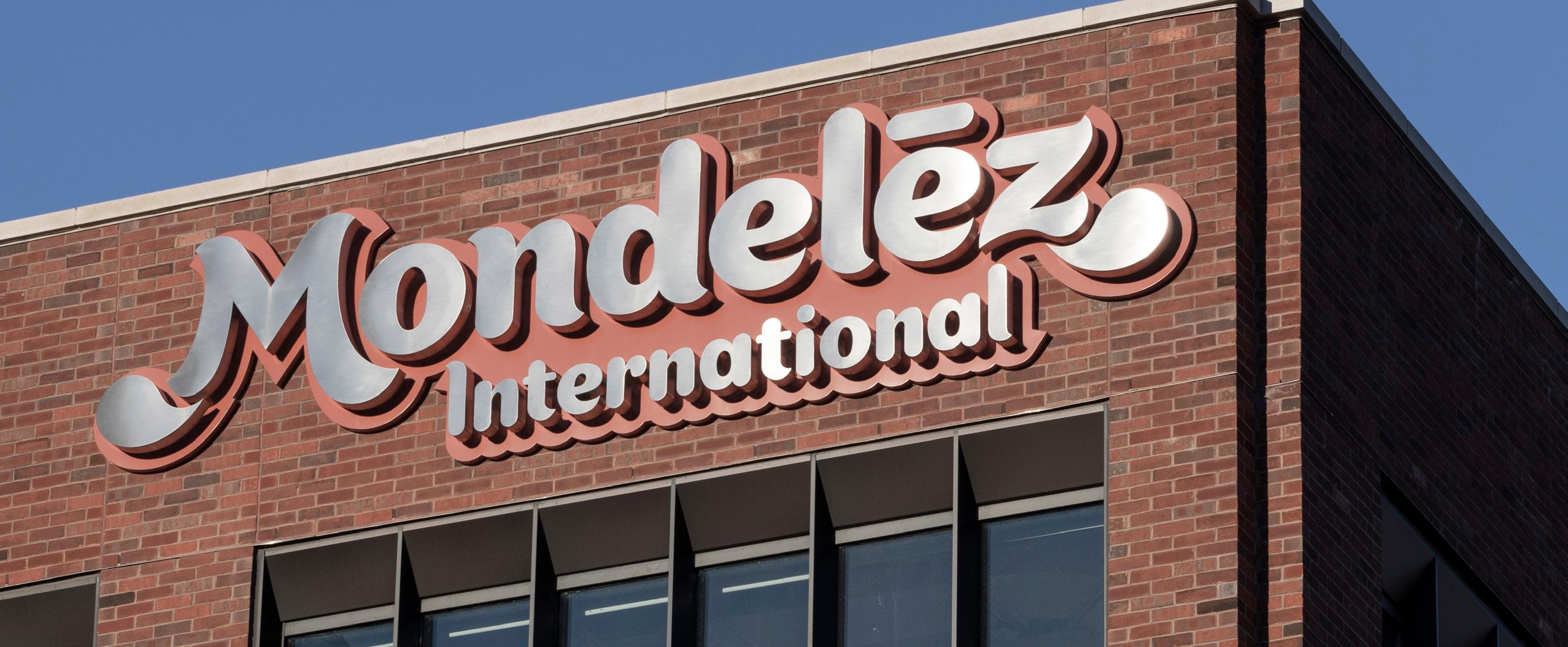
Wespath helps pioneer new approach for investors to mitigate human rights risks
Wespath partnered with global asset manager Schroders and strategic partner Heartland Initiative to co-author a white paper introducing a new way to identify and manage human rights risks in investment portfolios. The paper, The Saliency Materiality Nexus, offers a tool for investors to assess where human rights harms may become financially material.
The saliency-materiality nexus helps investors focus on the most serious human rights risks that could also impact a company’s bottom line. Saliency means how severe a human rights issue is—like forced labor or violence. Materiality means whether that issue could cost the company money or damage its reputation, leading to significant potential risks for shareholders.
Human rights risks for companies and shareholders most often translate into financial impacts in conflict-affected and high-risk areas (CAHRA). Examples of current CAHRA include the Democratic Republic of Congo and Ukraine.
While CAHRA pose a higher degree of risk, the paper is not meant to deter investment in these markets, because they depend on capital investment to spur economic growth, reduce conflict and bolster human rights protections. Rather, the paper introduces a practical, human rights-based framework that can focus investors’ efforts on identifying and addressing the most severe social risks in their portfolios.
Ahead of Oreo-maker Mondelēz’s 2024 shareholder meeting, Wespath filed a shareholder resolution that requested the company provide to its shareholders an independent third-party report to assess the effectiveness of the company’s implementation of its Human Rights Policy (HRP) in places like Russia and Ukraine. Wespath’s resolution received over 30 percent support from shareholders.
What is Wespath’s approach?
Wespath engages both asset managers and companies about risks in CAHRA and what they are doing to lessen those risks.
When Wespath engages asset managers on CAHRA risk, it begins by acknowledging these are complex, everevolving topics. Wespath makes clear it is not quizzing managers to determine if they know the “right” answer. Instead, Wespath stresses it is seeking information about an asset manager’s process for addressing CAHRA-related risks, which is still a relatively novel concept for many investors.
Wespath also engages the companies in which it invests to reduce their exposure to human rights risks. Wespath always starts by seeking a collaborative dialogue. When dialogue proves unproductive, Wespath may file a shareholder resolution. At Caterpillar’s 2023 shareholder meeting, Wespath asked the mining equipment manufacturer to report on how it manages human rights risks in CAHRA. The company had operations in several high-risk areas but lacked transparency around its human rights practices.
What is the saliency-materiality nexus?
When a company is close to a serious human rights problem—especially in places with conflict or weak laws— it can face lawsuits, fines or public backlash. That’s where saliency and materiality overlap. This framework helps investors spot these risks early, so they can make better decisions and encourage companies to act responsibly.
Learn More
Scan the QR code to read the full white paper: The Saliency Materiality Nexus

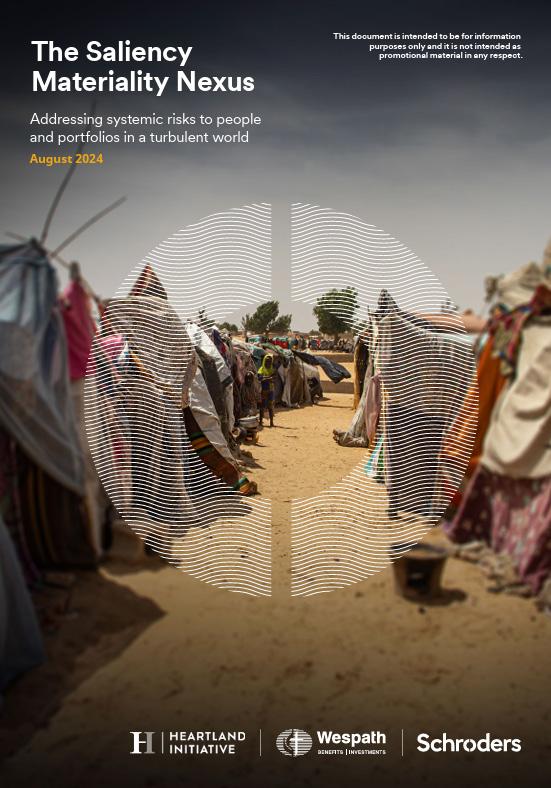
Wespath seeks transparency from Oreo-maker Mondelēz on human rights
The shareholder resolution Wespath filed with Oreo-maker Mondelēz requested the company provide to its shareholders an independent third-party report to assess the effectiveness of the company’s implementation of its Human Rights Policy (HRP) in places like Russia and Ukraine.
The accompanying timeline helps explain what prompted Wespath to file a shareholder resolution ahead of the company’s 2024 shareholder meeting, and how the process played out.
Russia invaded Ukraine, starting the largest and deadliest war in Europe since World War II.
Mondelēz saw a 303% increase in Russian profits in 2022.
A Mondelēz potato-chip plant and a Mondelēz biscuit factory were both damaged by a Russian military attack. The company said it recorded $75 million in property, plant and equipment impairments from the war, according to Reuters.
Wespath was the lead filer of a proposal that asked Mondelēz to commission an independent third-party report assessing the effectiveness of the company’s implementation of its human rights policy, with a focus on its operations in Russia and Ukraine.
Wespath concluded that Mondelēz did not have sufficient disclosure of its human rights policy in CAHRA. Wespath requested a meeting with the company to discuss our concerns. Mondelēz declined the request.
When support reaches 20-25%, companies are generally paying attention and willing to discuss implementing the proposal, even if only partially.
Susana McDermott, the Interfaith Center on Corporate Responsibility’s communications director, was quoted as saying in a Bloomberg story about the vote
The Financial Times published a letter to the editor by Wespath CEO Andy Hendren after Mondelēz chief executive Dirk Van de Put stated that investors do not “morally care” if the company continues to do business in Russia. Hendren called Van de Put’s comment “tin-eared and false.”
Wespath engaged with Mondelēz to discuss Wespath’s proposal filed at the company to be voted on during the company’s 2024 annual meeting.
Wespath engaged with various asset managers to discuss the resolution, including Norges Bank Investment Management. Reuters reported in late May 2024 that “Norges Bank, Mondelez’s 11th-largest shareholder according to LSEG’s Eikon, backed the proposal.”
Wespath filed a notice of exempt solicitation with the SEC that included a robust explanation for why shareholders should vote for Wespath’s Mondelez resolution.
At the annual meeting of Mondelēz’s shareholders, Wespath’s resolution received over 30 percent support from shareholders. While it wasn’t a majority, it passed a commonly accepted threshold for shareholder support.
Wespath helps Hampton University students win college competition
Students from Hampton University won the Intentional Endowments Network’s 2024 Student Corporate Engagement Challenge by pitching an investment in Intel and proposing engaging with the company on human rights risks in its supply chain. A Wespath employee mentored the five Hampton students throughout the competition.
“As the only HBCU team in the finals, this challenge was an extremely memorable experience for us,” Reid Hewitt, a member of the Hampton team, said in a statement.
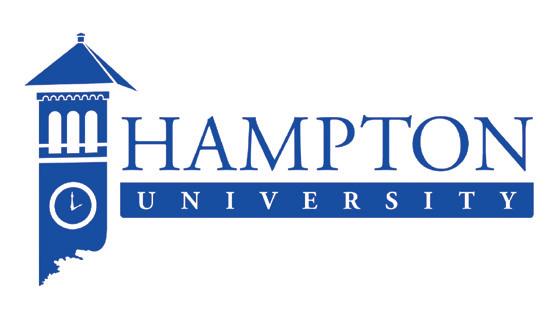
What is the Intentional Endowments Network (IEN)?
An investing network for higher education and other endowed institutions working together to create a world where all people thrive with equal access to personal and economic opportunities. IEN encourages and supports members to adopt long-term investment strategies that create an equitable, low-carbon and regenerative economy.
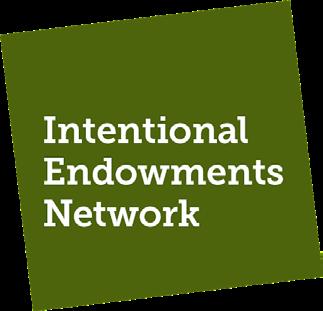
“It instilled a strong sense of pride and confidence in our abilities, proving that we can compete and excel at any level. Strong collaborative relationships and unwavering community support were critical to our success.”
Wespath staff also mentored the teams from Shenandoah University and Smith College in the Student Corporate Engagement Challenge.
“As the only HBCU team in the finals, this challenge was an extremely memorable experience for us. ”
Hampton University team member Reid Hewitt said in a statement
What is the Student Corporate Engagement Challenge?
As part of the semester-long program, teams of college students pitched an investment in a publicly traded company and recommended a shareholder engagement strategy. The intent of the proposed engagement was to both increase the value of the investment and drive positive impacts for society.
Teams presented their research and recommendations and were judged by employees from non-governmental organizations (NGOs), socially responsible investing firms, and philanthropic organizations.
Wespath engages with clothing companies Under Armour, Abercrombie
Wespath staff took part in collaborative engagements with Under Armour and Abercrombie & Fitch to discuss working conditions in the companies’ supply chains.

Wespath led an engagement with Under Armour as part of the Interfaith Center on Corporate Responsibility (ICCR) Equitable Supply Chains initiative in the first quarter of 2023. ICCR investors, who were joined by researcher KnowTheChain, requested information on how Under Armour is improving its approach to human rights and worker safety in its global supply chains.
The ICCR team also encouraged Under Armour to improve its disclosure. Wespath staff highlighted model contract clauses created by the American Bar Association for international supply chains that emphasize remediation efforts should prioritize victims of human rights violations.
Wespath staff, along with Mercy Investment Services, met with Under Armour in the third quarter of 2024 to discuss improvements to the company’s human rights due diligence framework. The discussion included an analysis of labor risks with both cotton-based fabrics and synthetic fabrics such as polyester.
In the third quarter of 2024, the discussion with Abercrombie & Fitch touched on working conditions in the company’s supply chain and traceability of cotton in the supply chain. Asset managers associated with ICCR also joined the engagement.
2025 and Beyond
Wespath files another shareholder proposal with Mondelēz After its shareholder resolution received over 30% support, Wespath reached out to Mondelēz multiple times. It took Mondelēz two months to respond. An engagement call was finally arranged in the first quarter of 2025. Mondelēz representatives were not prepared to respond to questions that had been submitted in advance. After Mondelēz demonstrated a lack of interest in investor engagement, Wespath filed a substantially similar proposal for shareholders to consider in 2025. The proposal received enough support to refile again for the 2026 proxy season.
Wespath will continue to engage with Mondelēz, asset managers and public policymakers on investments in Wespath’s portfolio in which we identify potential CAHRA issues.
Looking Ahead
A Message from the Chief Investment Officer
Thank you for taking the time to explore the many ways Wespath is working to serve our investors with integrity, purpose and a long-term perspective.
Throughout this report, we’ve highlighted how our sustainable investment strategies are evolving to meet the needs of a growing and increasingly diverse investor base. From the expansion of the Social Values Choice funds to our deepening working relationships with asset managers, we are focused on delivering investment excellence while staying true to our values.
We’ve also shared how our work in impact investing— particularly through the Positive Social Purpose Lending Program—is helping address critical issues like affordable housing and community development. And we’ve detailed our efforts to engage companies and policymakers on climate, biodiversity and human rights, always with the goal of creating long-term value for our clients and the communities they serve. All this work is an important reflection of our belief that sustainable investing is not a trend, but a long-term imperative. It’s a crucial part of how we manage risk, uncover opportunity, and support the people and institutions who rely on us.
As we look ahead, I hope it’s apparent that Wespath is not just holding steady—we are growing and evolving. We are growing not only in the number of investors we serve, but in the breadth of tools, strategies and partnerships we deploy to help them meet their goals. We are evolving by continuously building on our strong foundation of values-driven investing, while embracing new approaches that reflect the realities of a changing market and a changing world.
We know that the path forward won’t always be easy. But we also know that progress is possible when we stay grounded in our principles and open to innovation. That’s the mindset guiding our work.
Thank you for being part of this journey. We’re excited for what’s next.
Johara Farhadieh, Chief Investment Officer

